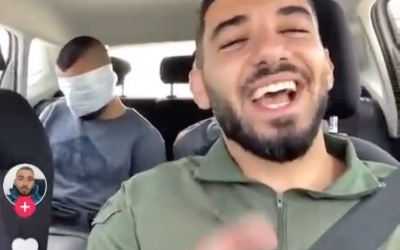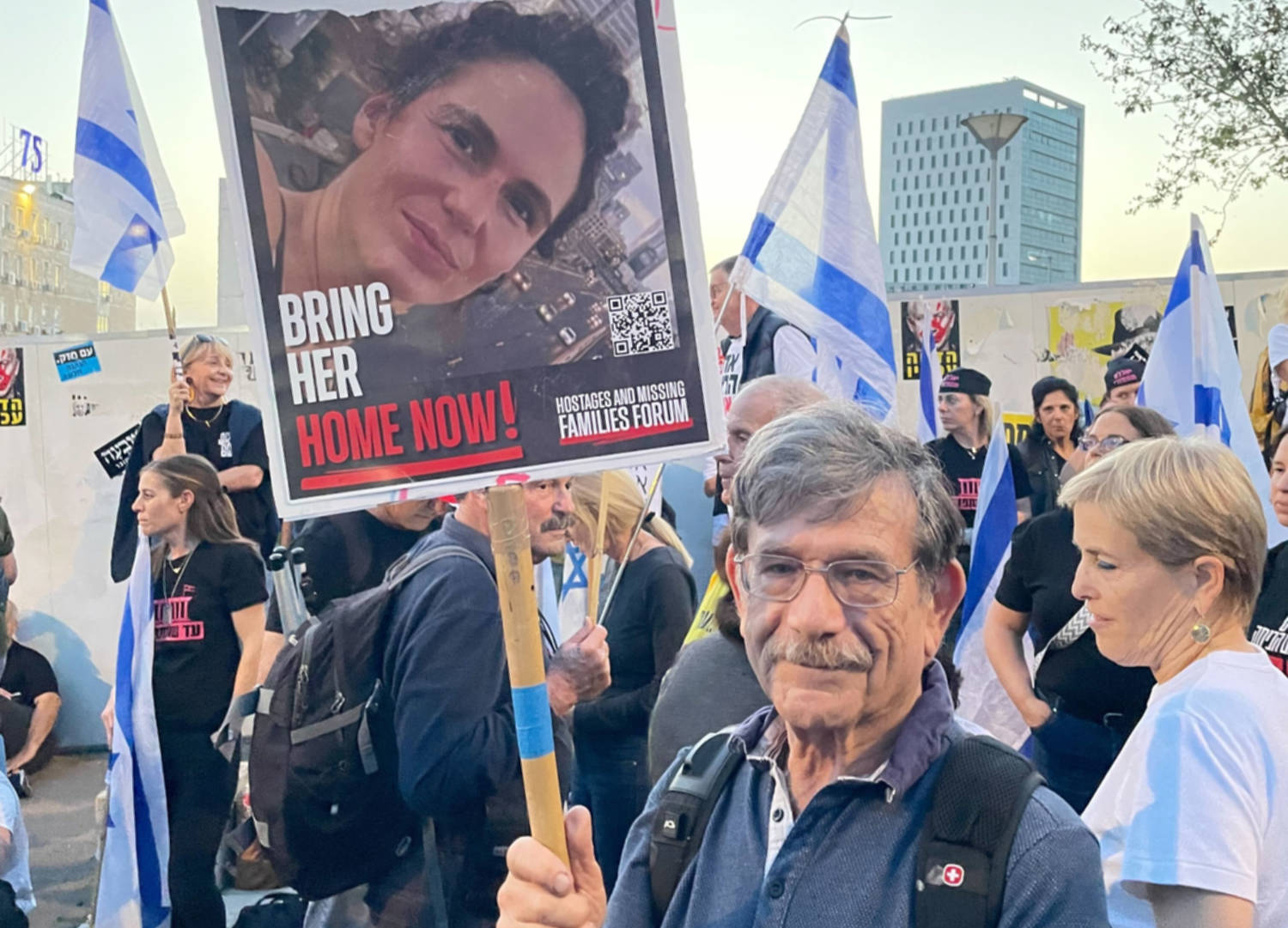Protests in Israel grow louder as anger over Gaza captives and Netanyahu converge

Above the throng of bodies packed on the sloping streets outside Israel’s parliament, Yoav Benjamini holds up an image of his daughter’s missing friend, Carmel Gat.
Six months have passed since Gat, 39, was taken captive along with 240 others in the Hamas-led attack on Israeli communities surrounding the Gaza Strip.
In that time, Gaza has been turned into a wasteland. More than 33,000 Palestinians have been killed. And, still, 133 people - Israeli soldiers and civilians, as well as 11 foreigners - remain captive.
Among them is Gat, who was visiting her parents in the Beeri kibbutz when rockets and fighters began pouring over the fence separating the enclave from Israel.
Though perhaps 50 of the missing Israelis are believed to be dead, hope remains for Gat.
Stay informed with MEE's newsletters
Sign up to get the latest alerts, insights and analysis, starting with Turkey Unpacked
“We know Carmel’s alive because some of the hostages that were released said they saw her teaching yoga in Gaza,” Benjamini, a statistician and professor, tells Middle East Eye.
Benjamini is one of tens of thousands of Israelis that protested over the past week in Jerusalem, massing outside the parliament building, known as the Knesset, and Prime Minister Benjamin Netanyahu’s residence.
After half a year of war, their patience is running thin. The numbers attending the demonstrations calling for the return of the captives – which have shifted from Tel Aviv to Jerusalem in an effort to ramp up pressure on Netanyahu and his government – have grown sharply over recent days.
Their demands have also found some common ground with those of anti-government protesters occupying the same space to call for Netanyahu’s resignation and new elections.
Those demonstrations have continued despite clashes on Tuesday night between riot police and protesters who police accused of trying to break through security barriers erected near Netanyahu’s residence.
Opinion polls in Israel on the issue of what should be done about the captives continue to deliver mixed messages.
According to one poll on Sunday, around half of the public says freeing the captives is their greatest priority, but almost three-quarters rejected agreeing to all of Hamas’s terms in order to make that happen.
But polls also show strong continuing support for the war. Recent polling suggests that most right-wing and religious Israelis prioritise destroying Hamas over freeing the captives.
What many appear to agree on is that more can – and should - be done. Yet another poll on Sunday found that 56 percent of Israelis believe the government is not doing enough to secure the captives’ release.
“I didn’t want to protest for the first few months. We needed to stick together as a country,” said Benjamini, who is a recipient of the Israel Prize, his country’s highest civilian honour. “But a lot of this is avoidable. There is no strategy.”
Netanyahu's real mission
From the outset, Netanyahu has insisted that continually waging war in the Gaza Strip is the best way to free the captives, arguing that it places pressure on Hamas.
The prime minister has described securing their release as a “sacred mission”, though his chief concern appears to be destroying Hamas, an aim that looks less realistic by the day.
Yet it is widely perceived that Netanyahu’s top war objective is something rather more personal: remaining in office.
'Netanyahu from the outset has put the matter of the hostages as his last priority'
- Eran Etzion, former deputy head of Israel’s national security council
A poll in January found just 15 percent of Israelis want Netanyahu to remain prime minister when the war ends.
For Israel’s prime minister, an end to the war on Gaza may well mean new elections, the end of his political career and - depending on his ongoing corruption trial - the end of his liberty.
Eran Etzion, former deputy head of Israel’s national security council, believes Netanyahu’s “political infinity” has been a primary obstacle in negotiations with Hamas.
“Netanyahu from the outset has put the matter of the hostages as his last priority. We also know that this was not among the goals of this war from the beginning,” Etzion tells MEE.
“All his conduct throughout suggests that, from his standpoint, this is a type of collateral damage he is willing to absorb.”
Negotiations between Hamas and Israel, alongside Qatar and the US, are set to continue in Cairo, the Egyptian capital. Any deal will be far more complex than the one that saw more than 100 captives released in November.
Today, Hamas seeks a full ceasefire, the return of Palestinians to northern Gaza and a full withdrawal of Israeli forces from the enclave, as well as a raft of Palestinian prisoners exchanged for the captives.
Netanyahu, meanwhile, appears in no mood to end the war, let alone leave Gaza altogether.
On Sunday he said “there will be no ceasefire without the return of hostages”, but also promised to invade southern Gaza’s Rafah, where hundreds of thousands of Palestinians have been displaced.
Pessimism over Cairo talks
Gershon Baskin is an Israeli former hostage negotiator and maintains contacts with people in Hamas.
“What they've said directly is that their assessment is that Netanyahu is not serious. He doesn't want any agreement, and Israel has just been wasting time,” Baskin tells MEE.
“Unless there's a decision by both sides that they want an agreement now, it could take quite a bit longer to reach an agreement. The problem is that Hamas wants an agreement that puts an end to the war, and they have their terms that they need.”
'Unless there's a decision by both sides that they want an agreement now, it could take quite a bit longer to reach an agreement'
- Gershon Baskin, former hostage negotiator
But, he adds, “the Americans are much more serious and have applied pressure all round” to bring people to Cairo for the new round of talks.
Etzion also sees a division between the political leadership in Israel and what he calls “the professionals” - the heads of various security services, like the Mossad, that are conducting the negotiations.
“There is a lot of anonymous information and many messages coming from the professionals, who are saying that an agreement is achievable and could already have been reached with the more flexible positions they favour,” he says.
But Netanyahu’s intransigence remains the main obstacle to any breakthrough, he adds.
“Netanyahu is still the one deciding and so we are stuck.”
Then there are the divisions between the families of the captives themselves.
While the mainstream Hostages and Missing Families Forum is increasingly pushing for an immediate deal, the Forum Tikvah, a collection of relatives belonging to the religious Zionist segment of society, is more supportive of the idea that Israel’s long-term security is achievable through war and outweighs the safety of the captives.
The government has been accused of stoking divisions, hoping to relieve pressure on itself.

“What I've heard is that the government has been politicising the hostages issues and creating conflicts within the hostage family group,” says Baskin.
“It has led to the senior staff of the family forum resigning. It has weakened the whole hostage issue. It managed to pretty much push it out of the public agenda for weeks, if not months.”
Families of the captives complain they are portrayed as “working for the enemy” in the right-wing Israeli media, and have been physically attacked on the street.
“Netanyahu wants to paint us as political, that the hostages’ families are attracted to the left,” says Yotam Cohen, the brother of Nimrod Cohen, a 19-year-old soldier held by Hamas.
“He is drawing this equation that says it’s either protecting Israel’s security or freeing the hostages, which is obviously false.”
Cohen, 22, is not optimistic about recent reports that Israeli negotiators have been given greater powers to find a deal in the upcoming Cairo talks.
“For the past three months, we have heard things like that and then as time goes on nothing happens. It’s an emotional rollercoaster and we don’t believe what the government says.”
Fear over war's end
Though the Hostages Families Forum has largely tried to stay apolitical, many of the families themselves are now aligning themselves with anti-government protesters that were mobilising weekly before 7 October.
Demonstrations have been seen in cities across Israel in recent days, led by the captives’ friends and families.
Will they be enough to pressure Netanyahu into making a deal? “I’m not sure,” says Baskin.
He notes it took a year and a half of pressure on the prime minister to make the deal with Hamas in 2011 that saw around 1,000 Palestinians freed in return for Israeli soldier Gilad Shalit, an exchange that Baskin helped negotiate.
“And that was not at a point when Netanyahu was looking at the end of his political career.”
For Etzion, the fate of the remaining captives is now intertwined with questions about the legitimacy of Netanyahu’s government and public anxiety about the end of the war itself.
He believes a large majority of the Israeli public would favour a deal to free them in return for a ceasefire and continuing negotiations on other issues. But many also remain wary and fearful that such an outcome could be presented as a victory for Hamas.
He sees an immediate change of government as a first step towards restoring public trust and addressing the difficult challenges that lie ahead.
“People are anxious and afraid,” says Etzion.
“They understand that the war is not going in the right direction, and that this government cannot bring an end to this war in a reasonable way.”
Middle East Eye delivers independent and unrivalled coverage and analysis of the Middle East, North Africa and beyond. To learn more about republishing this content and the associated fees, please fill out this form. More about MEE can be found here.





.jpg.webp?itok=VMTKHads)
